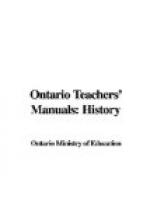1. Name, and tell
something about, four of the explorers of Canada
before 1759.
2. Name several other explorers of the New World.
3. Which explorer did the most for Canada, Champlain or La Salle?
4. In what wars
did the French fight against the Iroquois? With
what result?
5. What explorers
of North America were trying to find a way to
China and India? (This
investigation by the class may precede the
lesson on the “Road
to Cathay.” See p. 92.)
6. On what did
English kings base their claim to be the overlords
of Scotland? Trace
the dispute down to the Union of the Crowns in
1603.
7. Find out how the slave trade was treated by the English.
8. Make a list
of the early newspapers in Canada. Did they have
much influence on public
opinion?
9. Compare the
struggles for the control of taxation in Canada and
in the Thirteen Colonies
of America. Explain why these were settled
differently in the two
cases.
With questions such as these for investigation, no pupil will be likely to secure the full facts; each may state in the next lesson what he has found, and the work of each will be supplemented by that of the others. With succeeding investigations it may be expected that the pupils will be more eager to get at all the facts in the text-book. At any rate they are learning how to gather material from books—a very valuable training, no matter how simple the topic is.
When, in the ordinary course of work, lessons from the text-book are assigned, the teacher should indicate the important points, should suggest certain matters for discussion, and should note certain questions to be answered, indicating precisely where the information may be obtained. In the recitation period following, the topic should be fully discussed, the pupils giving the information they have secured from the text-book, and the teacher supplementing this from his knowledge gained through wider reading. During the discussion an outline should be made on the board, largely by the suggestions of the pupils, and kept in their note-books for reference and review. (See p. 100, Lesson on the Feudal System.)
DRILL AND REVIEW
As has been already stated (p. 15), the Story stage is useful chiefly for the purpose of arousing interest and developing the historical sense; no drill or review is necessary other than the oral, and, in Form II, sometimes the written, reproduction of the stories. The oral reproduction can be obtained in Form I by using the stories as topics in language lessons.
In the Information stage, where we are concerned more with the acquiring of facts, and in the Reflective stage, where we wish to relate facts to each other according to cause and effect, drills and reviews are necessary. During the lesson, a summary is placed on the black-board by the teacher or pupil, as indicated above. It is used as a guide in oral reproduction and may also be copied in special note-books and used for reference when preparing for review lessons. The teacher may look over these note-books occasionally.




